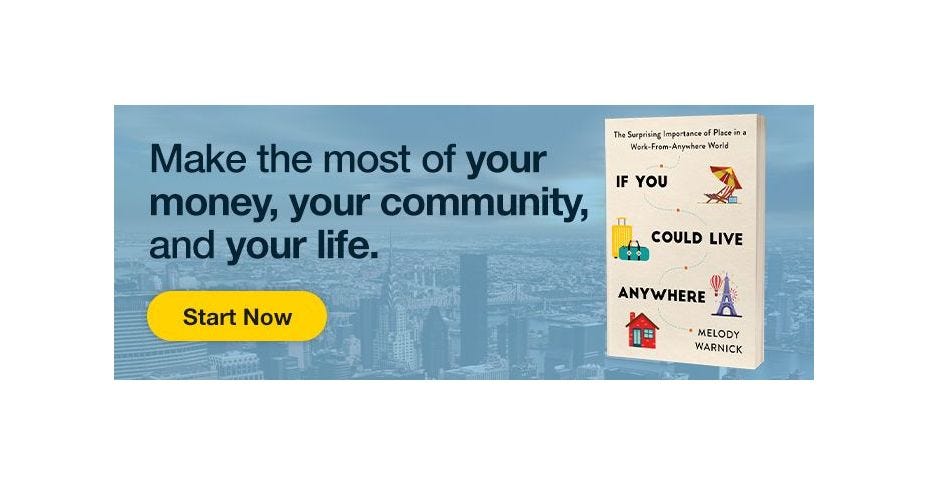A steadily growing economy is the gold standard by which economists measure a city’s success. More businesses, more output, more jobs, more revenue. More more more.
To a point, more money really can make your life better. A 2010 Princeton study famously found that $75,000 in annual income was the sweet spot for making individuals feel like their lives were going well—adjusted for inflation, that’s $91,000 in 2021. After that, more money didn’t add substantially to their well-being.
The “bigger and better” model of economic development isn’t helping communities be healthy, equitable, or sustainable either. As Bill McKibben points out in his wonderful book Deep Economy, “Perhaps the very act of acquiring so much stuff has turned us ever more into individuals and ever less into members of a community, isolating us in a way that runs contrary to our most basic instincts.”
We saw the evidence of economic inequities during the pandemic in the very nature of who got to become an Anywhereist. Overwhelmingly, it was white-collar workers who were able to hunker down with their families at home and service workers who had to keep showing up to jobs that offered very little in the way of financial security, health insurance, or protection against a new disease.
Even now, the benefits of work-from-anywhere are continuing to leave behind the poorest Americans. According to a Redfin survey, 78 percent of people who moved reported having more disposable income, despite having upgraded to a bigger house. But if you were moving in the first place, chances are you were a well-paid white-collar worker. Ninety percent of people earning more than $100,000 per year expect to be able to work virtually in the future, but only 10 percent of those who earn $40,000 or less per year. “The folks who need low-cost housing the most have the least flexibility to move,” points out Redfin CEO Glenn Kelman.
Spreading wealth to make sure that everyone does okay has never been one of the more successful functions of our economy. But in local communities, you see examples of Anywhereists who are trying to bypass old systems and set up a new world based on helping everyone do a little better.
Rudy Glocker built his outdoor apparel company, Burgeon Outdoors, in Lincoln, New Hampshire (population 1,600) because he wanted to have an impact there. He’d fallen in love with the state spending summers there as a kid but had seen the ravages of economic fluctuations and shrinking populations in the White Mountains. “Unfortunately a lot of jobs have migrated away from these communities, and I wanted to turn that around,” he told me.
Lincoln has some competitive advantages as an outdoorsy hub for skiers and hikers, but its tiny size was the bigger attraction for Rudy. “If I create ten jobs in New York City, no one even knows it,” Rudy says. “If I create ten jobs in a community of 1,500, wait a minute, you’re a percent of the workforce now. If you want to make an impact, you’ve got to go to a place where your impact is going to be felt.”
Surprisingly, it’s tough to hire locals with the right skills for the work. The mills closed 25 years ago, so few people are left here who know how to sew. If Burgeon was in New York City or Boston, Rudy might have better luck finding stitchers—and he might be able to get away with paying them less. “But it never really crossed my mind because that’s not what we’re trying to do,” Rudy says. “We’re not trying to create more jobs in Boston.” The point is to rebuild a struggling community. The clothing company just pays the bills.
So Rudy, an economist with an MBA from Harvard Business School, provides his employees flexible hours, a livable wage, healthcare, and monthly sales bonuses. He donates 5 percent of sales to local nonprofits, like New England Disabled Sports. And the company made and gave away 10,000 masks during Covid. In its small way, Burgeon is making life in rural New Hampshire more livable.
Save What You Love
Can you make change in your community without doing something grand like opening your own business or nonprofit? You can invest in people who are. In Philadelphia, a group called The Circles of Aunts and Uncles pools their money and provides small businesses loans to entrepreneurs, especially women, people of color, and people from low-income backgrounds who might not have easy access to other forms of capital.
Their first low-interest loan, in 2015, went to Hanifah Samad, who ran a Haitian Creole–inspired boutique called Fason De Viv. Hanifah had just moved her store to Philadelphia’s Old City neighborhood and needed capital for more inventory. The Circle of Aunts and Uncles stepped up.
Twenty-one other small business owners, including a small-batch ice cream maker, a cafe-charcuterie owner, a clothing designer, and a textile maker, have since been the recipients of the Aunts’ and Uncles’ largesse. They’re not just loan recipients; they’re considered “nieces” and “nephews” (and given advice accordingly).
If you want to make an impact in your town, invest in the people you want to see thrive and in the places that matter to you.
Maybe in a lot of towns, the place that matters is the local bar. Villagers in South Stoke were among eighty communities in England who saved their town pub, in their case by selling $600 shares to community members and recruiting volunteers to spend hundreds of hours sprucing up the place. When the Packhorse pub reopened, the whole town showed up. "We now have got 430 people who want it to work," said Dom Moorhouse, the local entrepreneur who led the Save the Packhorse effort. “They are our marketers."
- Melody Warnick, author of If You Could Live Anywhere

